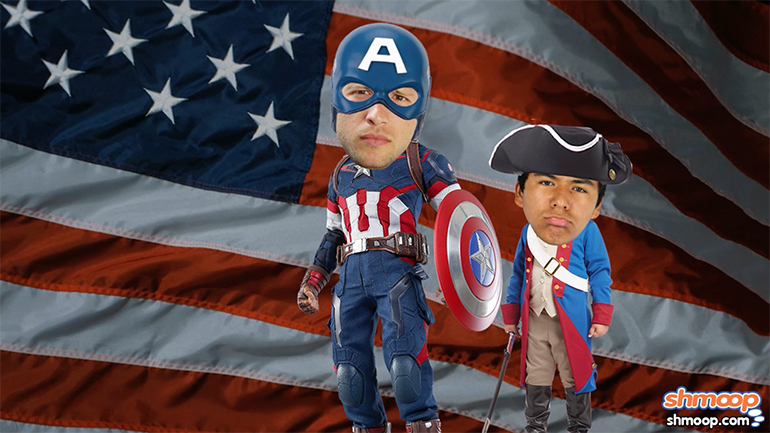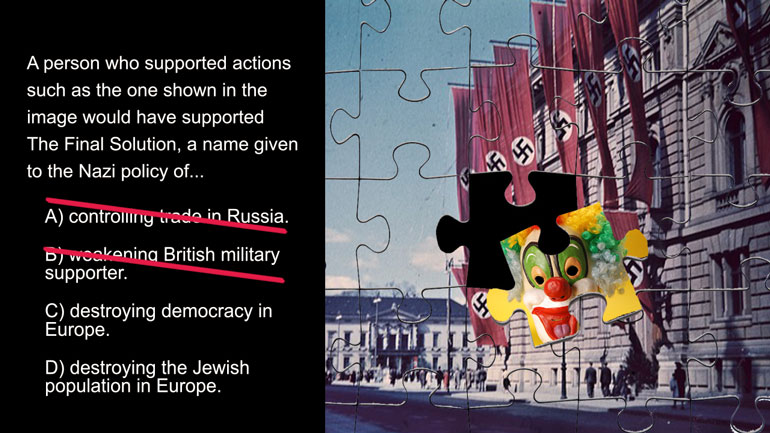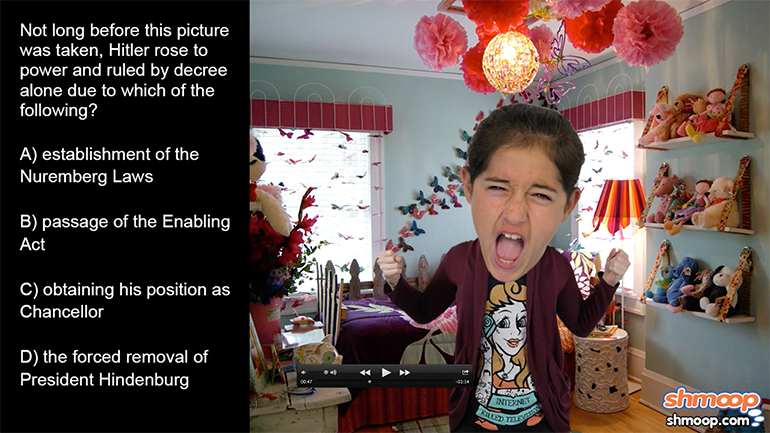ShmoopTube
Where Monty Python meets your 10th grade teacher.
Search Thousands of Shmoop Videos
AP European History 1.4 Period 3: 1815-1914 32 Views
Share It!
Description:
AP European History 1.4 Period 3: 1815-1914. As evidenced through the passage above, Karl Marx was a passionate leader and is considered the father of which of the following?
Transcript
- 00:04
And here's your schmoop du jour brought to you by Karl Marx the
- 00:07
long-forgotten sixth Marx brother we wonder why didn't keep them around in [Five Marx brother in a line and Karl appears at the back]
- 00:11
the act okay take a look at the following passage right there a communist disdain
- 00:17
to conceal their views and aims they openly declare that there ends can be
- 00:21
attained only by the forcible overthrow of all existing social conditions but
Full Transcript
- 00:25
the ruling classes tremble at a communistic revolution the proletarians
- 00:29
have nothing to lose but their chains, they have a world to win working men of
- 00:33
all countries unite [mumbling]
- 00:39
Anyway here's the question as evidence through the passage above, Karl
- 00:44
Marx was a passionate leaders and is considered the father of which of the
- 00:47
following and here are your potential answers all right well you know how we
- 00:52
know that Marx was a quote passionate leader unquote because he wrote that [Passage written on a chalkboard]
- 00:56
last line in all caps and if there's one thing we've learned from arguing with [Man giving a lecture]
- 01:01
internet trolls online it's that when they type in all capital letters it not
- 01:05
only means that they're passionate but they're probably right apparently that's [A woman teaching a class of young children]
- 01:09
just how arguing on the internet work sure we might disagree when you say that
- 01:13
Daniel Craig is the worst James Bond ever but second you hit that caps lock
- 01:17
key there's nothing more we can do you win this time...
- 01:21
But beyond being passionate what else do we know about mark and no he [a couple kissing in a field and Karl Marx appears]
- 01:27
wasn't actually a Marx Brother, but wouldn't that have been a great act
- 01:30
anyway he was the granddaddy of capitalism unless you meant to say
- 01:34
anti-capitalism but that would be pretty big oversight to me kind of like saying
- 01:39
Ross was the coolest character on friends which would make no sense until [Man thinking Ross was the coolest character on Friends and woman disagrees]
- 01:43
you realized you forgot to say the least which while still not making a perfect
- 01:46
grammatical sense here, would be still a heck of a lot closer than the truth so
- 01:50
so sorry Ross, hi. While Marx's ideas and socialism often do line up socialism
- 01:56
simply can't be tied to a single dude as variations on it are super old going [A really old man with wrinkles]
- 02:01
back as far as classical Greek philosophers go you know like plato..
- 02:05
not quite marxy enough for us, leaving us with communism and Anarchy so which
- 02:10
one is it well both aim to abolish the social inequalities caused by wage labor [Boy preparing to fire an arrow from a bow]
- 02:16
however anarchist don't recognise authority or law of any kind while
- 02:21
communists support a state ruled by the proletariat so which one was the
- 02:25
brainchild of marx, well communism of course marks believe that society
- 02:29
suffered under conflict associated with class struggles and that communal [Person giving a woman a piggy-back through a forest]
- 02:34
ownership of property could solve that problem which you know is more or less
- 02:39
the fundamental basis of communism we do wonder however if marks ever had [A large white church building]
- 02:43
roommates in college nothing teaches you about communal ownership faster than
- 02:47
disgusting bathrooms, piles of dishes, and never-ending conflict
Up Next
AP European History Period 1: 1450-1648 Drill 2, Problem 1. As a result of the meeting in the image, which of the following occurred?
Related Videos
AP European History Period 3: 1815-1914 Drill 2, Period 1, Les Demoiselles d'Avignon represented the beginning of which of the following art m...
AP European History Period 3: 1815-1914 Drill 2, Problem 4. Paintings like the one depicted above were a direct reflection of what?
AP European History 1.1 Period 4: 1914-Present. A person who supported actions such as the one shown in the image would have supported The Final So...
AP European History 1.2 Period 4: 1914-Present Not long before this picture was taken, Hitler rose to power and ruled by decree alone due to which...




